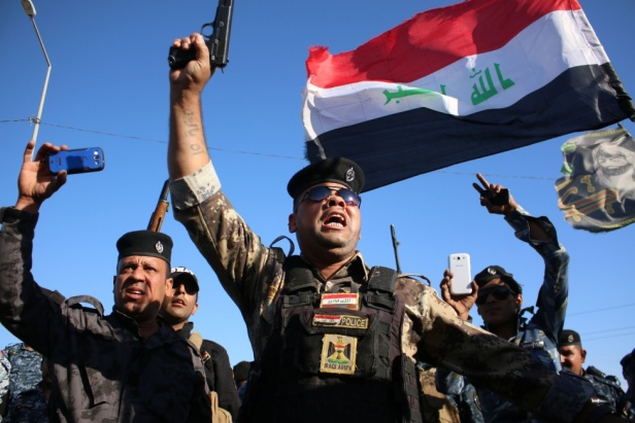As we watched Saddam’s statue crumble into memory, some Iraqis saw a coming national convalescence, one grounded by a functional democratic state and the support of the international community. Many more were skeptical, but hoped at least that democracy could salve the wounds of repression and war.
Yet – for still others – these wounds were opportunities in themselves; never meant to heal, but to fester.
Of course it wasn’t peace or democracy that emerged from the ruins of Baathist Iraq, but protracted occupation and civil war. More than a decade on, conflict entrepreneurs of every ideological stripe are still competing to fill Saddam’s void – if not simply to profit from it.
Yet, with perverse irony, the conflict has fostered at least one democratic ideal: equality. Even as the battle for influence – and the consequent spiral of revenge – has taken on an increasingly sectarian character, violence has been a constant in the lives of all Iraqis, equally. And the brutal egalitarianism of Iraq’s civil war is no more apparent than in the country’s besieged hospitals and clinics.
After nearly half a century of kleptocracy, punctuated by international sanctions and war, Iraq’s healthcare infrastructure is on the brink of collapse. With open insurrection in many of the country’s core provinces, even the fundamental conditions for impartial medical care have fallen under increased attack.
A colleague of mine, who I will refer to as Ahmed, has seen the parallel deterioration of security and healthcare first hand. In the city of Hit, 30 kilometres from Ramadi in Anbar province, Daesh, government forces, and tribal militias have been locked in sporadic combat for almost a year. As the fighting intensified, Ahmed, a pediatric specialist who worked at Hit’s hospital, looked to escape the violence by leaving for Baghdad.
But, as is now common in Iraq, Ahmed’s profession has made him a perpetual target. Upon his arrival in Baghdad, Ahmed received repeated death threats from Asa’eb Ahl al-Haq and other local Shia militias; they likely suspected him of treating Daesh wounded while in al-Anbar. With little alternative, Ahmed returned to Hit, hoping desperately that the conditions at his hospital had changed.
They had, but not as he’d hoped. When I last spoke with Ahmed in August, he was the only doctor left in the city; all others had fled or been killed in the Daesh advance. When the Iraqi army withdrew from Hit last October, the resultant frontline effectively blockaded the hospital, preventing civilian access to the nearby roads. Consequently, the facility has been unable to obtain functioning medical equipment or basic supplies, and has even been damaged in continued crossfire.
Like in Baghdad, Ahmed currently works in fear of retaliation simply for treating members of his community, regardless of association. To Daesh, the identity of Ahmed’s patients – the one thing that should matter least to a medical professional – could determine whether or not he commits an act of war simply by providing treatment. The same act of treatment, then, might also determine whether Ahmed lives or dies.
On an extremist’s whim, his basic defence of medical impartiality – the principle that a medical practitioner should not discriminate, but must rather provide universal care - could constitute a capital crime.
Ahmed’s story isn’t an isolated one. The multiplicity of armed actors, including Daesh, the Iraqi army and the Shia militias (themselves a loose network of "popular mobilisation forces"), has created a fatally unpredictable environment for healthcare providers and their families. In the absence of any stable policy framework, the medical field has seen a precipitous decline in regulation, support and protection; for Iraq’s poorest communities, a concurrent medication shortage has led to a resurgence of many previously contained infectious diseases.
Worse still, doctors are increasingly subject to the fickle commands of temporary occupiers, rather than to any hospital administration. In Mosul, for example, Daesh forces have occupied entire hospitals, threatening to destroy the homes and kill the families of doctors who flee. Reports indicate that Iraqi army units have assaulted hospitals in extremist-controlled areas, and combatants of all affiliations have seized medical facilities as military positions.
Nebulous, ever-shifting battle lines have meant that medical policies aren’t set by traditional standards, but by the winds of war. In practical terms, this means treating a particular patient one day – even with a gun to your head – might earn you a death sentence the next.
If the hospital switches hands, can you count on the conquering party to respect the Hippocratic Oath?
Unsurprisingly, this profound vulnerability to exploitation and reprisal has fuelled a mass exodus of Iraqi medical personnel. The Iraqi Medical Association reported that by 2007 at least “75 percent of doctors, pharmacists and nurses had left their jobs at universities, clinics and hospitals,” and that of this 75 percent more than half had fled the country outright.
Not every doctor left, however. During the same period, between 2003 and 2007, over 2,000 Iraqi doctors were killed, and another 250 kidnapped. In 2008, a survey of Iraqi physicians reported that more than 80 percent of the respondents had suffered at least one physical assault; 38 percent of emergency room personnel reported experiencing the threat of gun violence.
Still, in spite of the danger, many doctors like Ahmed continue to brave daily violence and intimidation to save the lives of their compatriots. They don’t do it for any sect, any ideology, or any political affiliation – and they know full well that saving another life could cost them their own. They do it so that those they heal might someday look past these divides, and instead reflect on the common wounds they all share as Iraqis.
The international community owes it to these doctors – and this country – to help them do so safely.
View source article


 RSS Feed
RSS Feed